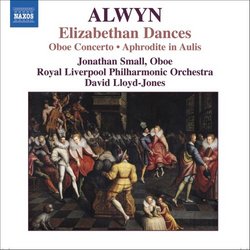| All Artists: William Alwyn, David Lloyd-Jones, Royal Liverpool Philharmonic Orchestra Title: Alwyn: Elizabethan Dances; Oboe Concerto Members Wishing: 0 Total Copies: 0 Label: Naxos Original Release Date: 1/1/2006 Re-Release Date: 12/12/2006 Genres: Dance & Electronic, Special Interest, Classical Styles: Marches, Ballets & Dances, Dances, Forms & Genres, Concertos, Historical Periods, Modern, 20th, & 21st Century, Instruments, Reeds & Winds, Symphonies Number of Discs: 1 SwapaCD Credits: 1 UPC: 747313014477 |
Search - William Alwyn, David Lloyd-Jones, Royal Liverpool Philharmonic Orchestra :: Alwyn: Elizabethan Dances; Oboe Concerto
 | William Alwyn, David Lloyd-Jones, Royal Liverpool Philharmonic Orchestra Alwyn: Elizabethan Dances; Oboe Concerto Genres: Dance & Electronic, Special Interest, Classical
|
Larger Image |
CD Details |
CD Reviews'All in Order Sweet and Lovely' J Scott Morrison | Middlebury VT, USA | 01/15/2007 (5 out of 5 stars) "I still remember my surprise and pleasure the first time I heard any of the concert music of William Alwyn: Symphonies Nos. 1 & 4 with Alwyn conducting the London Philharmonic on a Lyrita LP. Up to that time I'd known him only as a film composer ('The Rocking Horse Winner', 'Odd Man Out' among many others). The music was notable for its inventive orchestrations, its creative use of rhythm, its skillful mix of impressionist and modal harmonies, and its unfailingly beautiful melodies. It is, therefore, with great pleasure that I encountered this new release by David Lloyd-Jones conducting the Royal Liverpool Philharmonic, at least partly because there are a couple of important first recordings -- The Innumerable Dance, and Aphrodite in Aulis -- contained in the varied program.
The CD starts with Alwyn's 1956-57 'Elizabethan Dances', a six-part suite that alternates movements recalling the eras of Elizabeth I and Elizabeth II, a clever idea that but one that can be a little jarring as we go from music featuring tabors and pipes to music with bluesy harmonies. I can't hear the first movement without initially thinking of stereotypical American Indian music with the square drum rhythms coupled with open fifths, although within a few seconds we are thrown back into the ceremonial music of the Virgin Queen's court. One is amused by the final movement which alternates between a rumba and a hornpipe! This, if nothing else, typifies Alwyn's sense of humor, never hidden for long. 'The Innumerable Dance - An English Overture' takes its title from a passage in Blake's 'Milton': "And flower and herb soon fill the air with an innumerable dance / Yet all in order sweet and lovely." A ten-minute-long tone poem written in 1933, it is an evocation of an English spring, opening with hushed divisi tremolando strings followed by muted horns. Further tonal weight is gradually added until we reach a scintillating sunrise and a spirited dance. This is gorgeous (and gorgeously played) pastoral English music reminiscent of Delius. The present recording is possibly its first performance in almost seventy years and we are the richer for it. 'Concerto for Oboe, Harp and String' (1943-44) features Jonathan Small, oboe, and Eleanor Hudson, harp. It was given its premiere by Evelyn Rothwell, wife of John Barbirolli who was a staunch advocate of Alwyn's concert music. In two movements played without pause, this 18-minute work moves from a nostalgic and impressionistic opening to a virtuosic and spry modal dance before closing with return of the initial material. Although the work is played well here, it is for me a marginally less appealing performance than that on a Chandos recording with oboist Nicholas Daniel and the City of London Sinfonietta under Richard Hickox. 'Aphrodite in Aulis - An Eclogue for Small Orchestra, after George Moore' (1932) is an ethereally evocative miniature for flute, two horns, harp and strings. Like 'The Innumerable Dance', it has not been heard for seventy years. I could easily imagine it working its way into the margins of the mainstream repertoire, particularly if given such an exquisite performance as heard here. I must say that this is the piece that I returned to most on this disc. Absolutely delicious! Very nearly as lovely, though, and twice as long, is 'The Magic Island' (1952), a so-called 'Symphonic Prelude', inspired by lines from 'The Tempest': "... the isle is full of noises / Sounds and sweet airs, that give delight and hurt not." From an atmospheric, quiet beginning it swells to a climax beginning at 3:50: "a thousand twangling instruments / will hum about mine ears ..." Of the works presented here, 'The Magic Island' presents Alwyn most convincingly as the master orchestrator that he was. It was, incidentally, commissioned by Barbirolli. And, finally, we get a good old-fashioned Elgarian 'pomp and circumstance' style march, the 'Festival March' written for the 1951 Festival of Britain. Full of 'nobilmente' and 'grandioso' atmosphere, it deserves to stand with similar contemporaneous works by Walton as well as those by Elgar. A marvelous end to a marvelous program of works, not a one of them weak or derivative, by a composer whose stature can only grow, William Alwyn. Enthusiastically recommended. Scott Morrison" |

 Track Listings (12) - Disc #1
Track Listings (12) - Disc #1